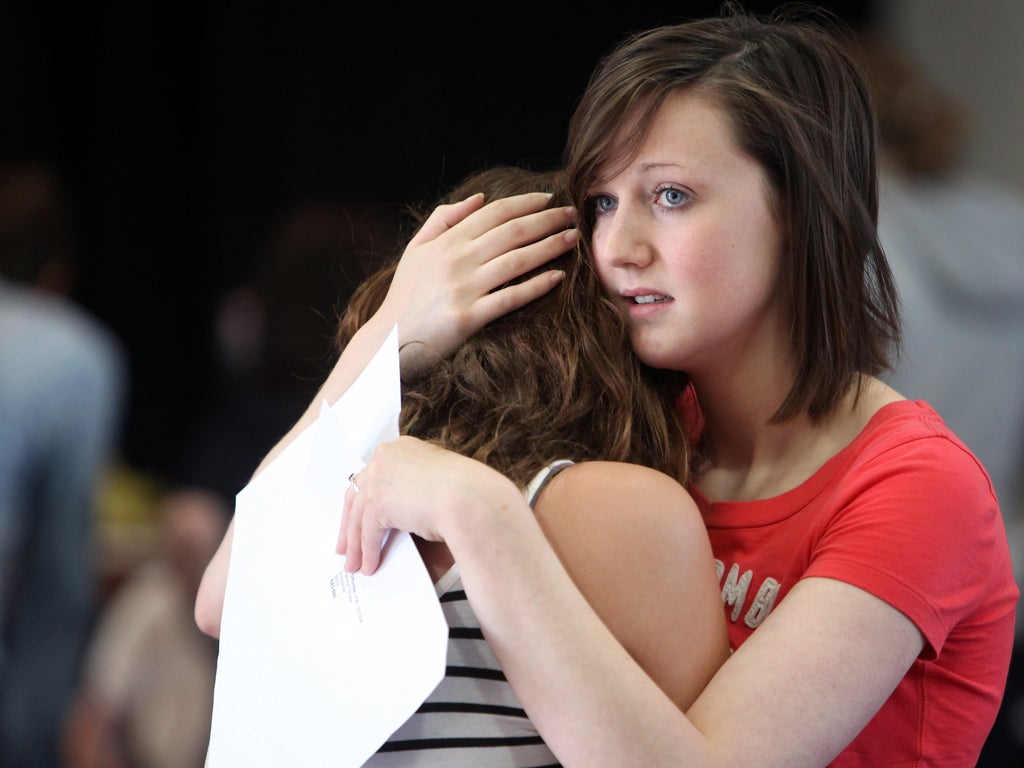Three Bs at A-level? Too many teenagers are in danger of being written off, say heads
'There is quite a lot of value in obtaining other grades'

Your support helps us to tell the story
From reproductive rights to climate change to Big Tech, The Independent is on the ground when the story is developing. Whether it's investigating the financials of Elon Musk's pro-Trump PAC or producing our latest documentary, 'The A Word', which shines a light on the American women fighting for reproductive rights, we know how important it is to parse out the facts from the messaging.
At such a critical moment in US history, we need reporters on the ground. Your donation allows us to keep sending journalists to speak to both sides of the story.
The Independent is trusted by Americans across the entire political spectrum. And unlike many other quality news outlets, we choose not to lock Americans out of our reporting and analysis with paywalls. We believe quality journalism should be available to everyone, paid for by those who can afford it.
Your support makes all the difference.Teenagers who gain three B grade passes at A-level are in danger of being written off as failures, headteachers are warning.
University recruitment figures today showed record numbers of students had already signed up for courses this autumn - 401,540 compared with a previous highest figure of 397,670 recorded two years ago when scores of students were trying to avoid the introduction of fees of up to £9,000 a year in 2012.
Many universities told The Independent that their numbers had been swelled by being able to expand their intake by recruiting teenagers with at least one A grade and two B's under a new government policy.
One university, Exeter, said it was recruiting 600 extra students this year as a result of a 34 per cent rise in applications. More than half the applicants had three A grade passes or better.
Professor Janice Kay, deputy vice-chancellor, said: "This has been our best year yet for applications and we look forward to welcoming a record intake of 4,600 students in September."
Brian Lightman, general secretary of the Association of School and College Leaders, said: "I'm worried about seeing people with B grades being labelled as failures.
"There is quite a lot of value in obtaining other grades and I think that is really important to note."
Andrew Hall, chief executive of the AQA exam board, added that he felt the B grade at A-level was assuming far greater importance as a result of the Government's reforms.
However, Universities Minister David Willetts, said that the decision to allow universities to recruit unlimited numbers of students with ABB grade passes need not restrict the chances of those with a lower qualification.
"The ABB's only account for 120,000 places - that's roughly a third of the intake," he told The Independent. "There are still two-thirds of places left for the rest."
The latest figures from UCAS, the universities and colleges admission service, revealed that the number of students still seeking places through the clearing system was at its lowest level for four years - with 153,070 eligible to obtain places through clearing. A further 75,710 are still awaiting confirmation of a place.
Mr Willetts said he thought that there might be fewer candidates obtaining places through clearing this year - as a result of so many students confirming places early.
At least six universities in the Russell Group - which represents 24 of the country's most research intensive higher education institutions - are not in the clearing system, having already filled up their places. They are Oxford, Cambridge, UCL, Imperial College, Bristol and the London School of Economics.
One university, Manchester, started off in clearing with 300 places available but this had been whittled down to 100 yesterday. Those remaining were mainly in foreign languages - where there was a dearth of candidates because of yet another slump in the take-up of the subject.
Universities in the 1994 group, which represents 11 other research-based universities like Essex, Goldsmiths, University of London, Lancaster, Leicester, Loughborough and Sussex, said yesterday they still had a small number of places available for A-level candidates with high grades - but that they were being snapped up quickly.
Thousands of those eligible for clearing are still likely to be unable to find a place - as figures from last year showed only around 50,00 students entered university last autumn via the clearing system.
Meanwhile, UCAS revealed that around 40 per cent of the 3,800 callers who contacted their exams hotline on Thursday had asked careers advisers to give them details of other casreer options after receiving disappointing A-level results. These included opting for alternative further education qualifications or trying vocational learning routes or training through employment. Others ought advice about taking a gap year.
Join our commenting forum
Join thought-provoking conversations, follow other Independent readers and see their replies
Comments